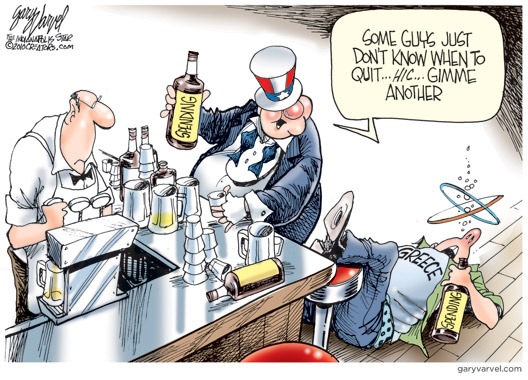Caution: For those who think I should stick to science, turn your eyes away now.
When my daughter studied in Greece several year ago, one of the first things she told me when she got there (and easily the most memorable) was “Dad, these people don’t know how to make money”.
Greeks, along with so many others in the world, have been fooled by the notion that prosperity can be achieved with a minimum of work. By “work” I mean as many people as possible, doing useful things for each other, as efficiently as possible.

No monetary policy or economic stimulus can supplant this basic truth. It is a necessary, but possibly not sufficient, requirement for prosperity. The role of government in this fundamentally private sector-driven process is to make sure people play fair, and then get out of the way.
When government bureaucrats become the ones who decide which goods and services are the most important, or what those should cost, or just how much of that wealth they will siphon off to give to those who don’t work, prosperity for a nation as a whole suffers.
I’ve long wondered how people can be fooled into believing work can be avoided, and the most central misconception I keep coming back to is this: If a person believes the same amount of stuff is going to be made anyway, then the only argument left is who gets how much, and the goal of an equitable distribution of wealth becomes central.
But one only need look around the world to see that wealth generation varies widely. It’s not even related to how many natural resources a country has, otherwise Japan would never have prospered and Russia should be one of the most prosperous countries on Earth. Haiti would be just as prosperous as Hong Kong.
The “constant pie” mindset was revealed by President Obama in his speech yesterday at the University of Wisconsin – La Crosse, when he said, “Being an American is not about taking as much as you can from your neighbor before they take as much as they can from you.”
Obama has mastered the art of presenting platitudes that sound on the surface like he’s a free market guy, but his policies end up not encouraging the generation of wealth, but instead redistributing wealth from the dwindling few who still generate it.
Since we do not teach basic economics to our children, this kind of message becomes seductive to the masses. It is an old message, historically, and it always ends badly.
There is no easy way to prosperity, just as there is no free lunch.
A second point often missing from the discussion is this: prosperity depends upon efficiency (e.g. mass production), which generally requires large investments. So, unless those with the means to invest have some hope of being able to keep their profits (since most will fail, and lose their investment), the system will not work.
Those few who have gotten immensely wealthy, generally speaking, have kept only a tiny fraction of the extra wealth they have generated for the country as a whole. They did not unfairly take from the rest of society; society freely gave it to them in exchange for something we wanted (e.g. iPhones).
When we threaten to take away their reward for a (risky) job well done, the system collapses. Politicians who then play the class envy card may gain some short term political points, but it will be at the expense of the country’s economic health.
In the 2015 Index of Economic Freedom, Heritage Foundation ranks Greece 130th out of 178 countries (Venezuela, Cuba, and North Korea rank last). Yet, this Forbes article with opinions from 3 Harvard Business School professors asked to comment on the Greek crisis fails to even bring up this systemic problem, and instead offers only vague platitudes.
So, again, any government economic policy must (in my admittedly simple minded opinion) always be judged against the single overriding goal for a country hoping to achieve prosperity: “As many people as possible, doing useful things for each other, as efficiently as possible.”
If a government’s policies cannot support that basic goal, there will be nothing of value to govern, and the original poor among us (whose numbers will increase dramatically) will be even worse off than they were before.
Now back to our regularly scheduled programming.

 Home/Blog
Home/Blog



